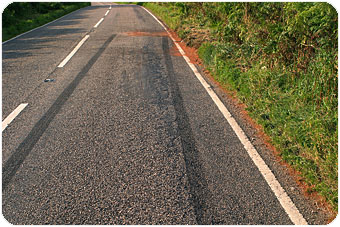FEATURE ARTICLE -
Case Notes, Issue 39: Dec 2009
C.A.L. No 14 Pty Ltd v Motor Accidents Insurance Board; C.A.L. No 14 Pty Ltd v Scott [2009] HCA 47 (10 November 2009)
A hotel licensee and a customer made an informal arrangement to avoid the potential consequences of the customer being breathalysed. The customer handed over his motorcycle and its keys to the licensee. Later, having consumed a considerable quantity of alcohol, he required their return. On the way home, riding the motorcycle, the customer had an accident and was killed. The High Court has held that neither the proprietor of the hotel nor the licensee had a legal duty to refuse the customer access to the motorcycle and the keys to prevent him suffering an injury which might result from his consumption of alcohol.
On 24 January 2002 Shane Scott met a friend at the Tandara Motor Inn at about 5.15pm for a drink. A rumour circulated through the hotel that a police breathalyser was operating near Mr Scott’s home. At the urging of his friend Mr Scott made an informal arrangement with the licensee to hand over the keys of his wife’s motorcycle (which he was driving) and have the motorcycle secured in a storeroom, in order to avoid the police breathalyser. The licensee understood, when the arrangement was made, that Mrs Scott would be called to collect her husband when he wanted to leave.
 At about 8.15pm Mr Scott decided to go home but emphatically refused the licensee’s offer that his wife be called. He requested the keys to the bike and, to three separate enquiries as to whether he was “right to ride” replied, “Yes, I’m fine”. The licensee retrieved the motorcycle from the storeroom and handed the keys over to Mr Scott. He then rode off. Seven hundred metres from his home, which was about seven kilometres from the hotel, he ran off the road and suffered fatal injuries. At the time of the accident his blood alcohol content was 0.253.
In proceedings in the Supreme Court of Tasmania Mrs Scott and the Motor Accidents Insurance Board of Tasmania (MAIB) (which, pursuant to applicable Tasmanian legislation, had paid sums to or on behalf of Mrs Scott) alleged that CAL No 14 Pty Ltd (the proprietor of the Tandara Motor Inn) and the licensee both owed duties of care to Mr Scott, which they had breached. The trial judge held that neither owed any relevant duty of care to Mr Scott. However the Full Court of the Supreme Court of Tasmania, by a majority, held that each of the proprietor and the licensee owed a duty of care to Mr Scott and that their breach of that duty had caused his death. The High Court granted special leave to appeal the Full Court’s decision.
At about 8.15pm Mr Scott decided to go home but emphatically refused the licensee’s offer that his wife be called. He requested the keys to the bike and, to three separate enquiries as to whether he was “right to ride” replied, “Yes, I’m fine”. The licensee retrieved the motorcycle from the storeroom and handed the keys over to Mr Scott. He then rode off. Seven hundred metres from his home, which was about seven kilometres from the hotel, he ran off the road and suffered fatal injuries. At the time of the accident his blood alcohol content was 0.253.
In proceedings in the Supreme Court of Tasmania Mrs Scott and the Motor Accidents Insurance Board of Tasmania (MAIB) (which, pursuant to applicable Tasmanian legislation, had paid sums to or on behalf of Mrs Scott) alleged that CAL No 14 Pty Ltd (the proprietor of the Tandara Motor Inn) and the licensee both owed duties of care to Mr Scott, which they had breached. The trial judge held that neither owed any relevant duty of care to Mr Scott. However the Full Court of the Supreme Court of Tasmania, by a majority, held that each of the proprietor and the licensee owed a duty of care to Mr Scott and that their breach of that duty had caused his death. The High Court granted special leave to appeal the Full Court’s decision.
In the High Court the MAIB and Mrs Scott (the respondents) argued that the licensee had a duty to comply with the agreement reached between him and Mr Scott to ring Mrs Scott when Mr Scott decided he wanted to go home. In failing to make the call the licensee breached that duty of care, thereby causing Mr Scott’s death. The High Court rejected this argument. Even if the licensee had owed such a duty to Mr Scott it was impossible to conclude on the basis of the evidence either that he could have made such a call or, if he had made such a call, that it would have prevented Mr Scott’s death. The Court also considered that, if the licensee had owed such a duty to Mr Scott, he had complied with the duty when he offered to call Mrs Scott at around 8.15pm – an offer which was rejected.
The High Court held that the licensee owed no relevant duty of care to Mr Scott. The informal arrangement for the storage of the motorcycle was made for Mr Scott’s convenience, and did not empower the licensee to deny Mr Scott’s right to recover the keys and the motorcycle, should he request them. The Court also held that the duty argued for by the respondents would have conflicted with Mr Scott’s right and capacity to act in accordance with his own wishes, and would also have been incompatible with other legal duties which bound the licensee. The High Court allowed each appeal and ordered judgment in favour of the proprietor and the licensee.
 Adeels Palace Pty Ltd v Moubarak; Adeels Palace Pty Ltd v Bou Najem [2009] HCA 48 (10 November 2009)
Adeels Palace Pty Ltd v Moubarak; Adeels Palace Pty Ltd v Bou Najem [2009] HCA 48 (10 November 2009)
Adeels Palace should not be held liable for injuries arising from violent conduct, in the circumstances where the evidence did not establish there was action it could have taken which would, on the balance of probabilities, have prevented that conduct from occurring, the High Court has held.
In the early hours of New Year’s Day 2003 a dispute arose on the dance floor of the Adeels Palace
Restaurant, after a female patron accused another of brushing her hand with a lighted cigarette. Fighting erupted and became “more ferocious very quickly”. One of the patrons left the restaurant
after he was struck in the face. He returned soon after with a gun. In an unprovoked act he shot Mr Bou Najem in the leg in the restaurant’s kitchen. He then went into the restaurant proper and found Mr Moubarak, the man who had struck him. He shot Mr Moubarak in the stomach. Mr Moubarak and Mr Bou Najem both sued Adeels Palace, alleging that they had suffered their injuries as a result of the negligence of Adeels Palace in failing to provide any or any sufficient security during the New Year’s Eve function. Both men were successful in the NSW District Court. The Court of Appeal for NSW dismissed appeals filed by Adeels Palace. The High Court granted Adeels Palace special leave to appeal.
The High Court held that the issues in the case had to be determined in the light of the relevant provisions of the Liquor Act 1982 (NSW) and the Civil Liability Act 2002 (NSW). The High Court concluded that, concomitant with its responsibilities under the Liquor Act to not permit indecent, violent or quarrelsome behaviour on licensed premises and to eject persons who engaged in such behaviour, Adeels Palace owed a duty to all of its patrons (including Mr Moubarak and Mr Bou Najem) to take reasonable care to prevent injury arising from the violent, quarrelsome or disorderly conduct of other persons. However, the High Court held it was unnecessary to determine whether there had been a breach of the duty. That was because the evidence did not establish that the provision of greater security, to the level which Mr Moubarak and Mr Bou Najem argued should have been provided, would have either deterred or prevented the gunman from re-entering the restaurant. Section 5D of the Civil Liability Act required Mr Moubarak and Mr Bou Najem to establish that the restaurant’s negligence in failing to provide any or any sufficient security was a necessary cause of the damage they each suffered, but the evidence only went so far as to establish that if there had been more security in the restaurant on New Year’s Eve that might have prevented the damage caused by the gunman. It did not show that more security would, on the balance of probabilities, have prevented their injuries.
The High Court allowed each appeal and ordered that the decisions of both the Court of Appeal and the District Court be set aside.
International Finance Trust Company Limited v New South Wales Crime Commission [2009] HCA 49 (12 November 2009)
Section 10 of the Criminal Assets Recovery Act 1990 (NSW) (the Act) is constitutionally invalid, a majority of the High Court has held.
On 13 May 2008 the New South Wales Crime Commission commenced proceedings in the New South Wales Supreme Court which sought, amongst other things, restraining orders under section 10 of the Act in relation to various bank and share trading accounts over which the appellants in this case (International Finance Trust Company Ltd and International Finance Trust Company Broking Services Ltd) exercised effective control.
 Section 10(2)(b) of the Act effectively provides that the Commission may make an ex parte application (ie — an application made without notice to the affected party and determined in the absence of that party) to the Supreme Court for a restraining order preventing dealings with interests in property which is suspected to have been derived from serious crime related activity. Under section 10(3) of the Act the Supreme Court must make the order if the application for the order is supported by an affidavit of an authorised officer which deposes to the grounds upon which the officer suspects the property is serious crime derived property, and, having regard to the matters raised in the affidavit, the Supreme Court considers there are reasonable grounds for the suspicion. The party whose property interest is affected by the order may apply under section 25 of the Act for orders excluding those interests from the operation of the restraining order, but must prove that it is more probable than not that the property was not acquired fraudulently or illegally.
A single judge of the Supreme Court made the order sought. On appeal the Court of Appeal of the Supreme Court of New South Wales set aside the restraining order — a majority of that court found there was no admissible evidence before the primary judge that provided reasonable grounds for the suspicion asserted by the authorised officer in the affidavit supporting the original application. However, the Court of Appeal unanimously rejected an argument that section 10 was constitutionally invalid. The High Court granted special leave to appeal against that decision.
By majority the High Court determined that section 10 was invalid. The majority considered that section 10 did not require the Commission to make ex parte applications for restraining orders. However, if the Commission did make an ex parte application, then the Supreme Court was required to make the restraining order if it was satisfied that the authorised officer’s affidavit reasonably supported that officer’s suspicions about the derivation of the property the subject of the application. Once the order was made, it could only be discharged in two circumstances: if an application for assets forfeiture was no longer pending in the Supreme Court (however the legislation imposed no limit on the time within which an assets forfeiture application had to be determined); or upon an application by the affected party under section 25 of the Act, which could only succeed if the affected party was able to prove it was more probable than not that the relevant property was not fraudulently or illegally acquired — a negative proposition of broad import. The majority concluded that in these circumstances section 10 was “repugnant to the judicial process in a fundamental degree”. The Court allowed the appeal, ordered that the relevant proceedings in the Supreme Court should be dismissed with costs, and declared section 10 invalid.
Section 10(2)(b) of the Act effectively provides that the Commission may make an ex parte application (ie — an application made without notice to the affected party and determined in the absence of that party) to the Supreme Court for a restraining order preventing dealings with interests in property which is suspected to have been derived from serious crime related activity. Under section 10(3) of the Act the Supreme Court must make the order if the application for the order is supported by an affidavit of an authorised officer which deposes to the grounds upon which the officer suspects the property is serious crime derived property, and, having regard to the matters raised in the affidavit, the Supreme Court considers there are reasonable grounds for the suspicion. The party whose property interest is affected by the order may apply under section 25 of the Act for orders excluding those interests from the operation of the restraining order, but must prove that it is more probable than not that the property was not acquired fraudulently or illegally.
A single judge of the Supreme Court made the order sought. On appeal the Court of Appeal of the Supreme Court of New South Wales set aside the restraining order — a majority of that court found there was no admissible evidence before the primary judge that provided reasonable grounds for the suspicion asserted by the authorised officer in the affidavit supporting the original application. However, the Court of Appeal unanimously rejected an argument that section 10 was constitutionally invalid. The High Court granted special leave to appeal against that decision.
By majority the High Court determined that section 10 was invalid. The majority considered that section 10 did not require the Commission to make ex parte applications for restraining orders. However, if the Commission did make an ex parte application, then the Supreme Court was required to make the restraining order if it was satisfied that the authorised officer’s affidavit reasonably supported that officer’s suspicions about the derivation of the property the subject of the application. Once the order was made, it could only be discharged in two circumstances: if an application for assets forfeiture was no longer pending in the Supreme Court (however the legislation imposed no limit on the time within which an assets forfeiture application had to be determined); or upon an application by the affected party under section 25 of the Act, which could only succeed if the affected party was able to prove it was more probable than not that the relevant property was not fraudulently or illegally acquired — a negative proposition of broad import. The majority concluded that in these circumstances section 10 was “repugnant to the judicial process in a fundamental degree”. The Court allowed the appeal, ordered that the relevant proceedings in the Supreme Court should be dismissed with costs, and declared section 10 invalid.
 Zurich Australian Insurance Ltd v Metals & Minerals Insurance Pte Ltd [2009] HCA 50 (2 December 2009)
Zurich Australian Insurance Ltd v Metals & Minerals Insurance Pte Ltd [2009] HCA 50 (2 December 2009)
Provisions in general insurance contracts which limit or exclude the liability of an insurer to indemnify the insured party against loss by reason that the party has entered into another contract of insurance in relation to the same risk are rendered void by s 45 of the Insurance Contracts Act 1984 (Cth). The High Court has held, however, that s 45 does not render void provisions which exclude or limit liability where the insured is not a party to the other insurance contract, although named in it as an insured person. Neither does s 45 render void an entire clause of an insurance contract merely because it includes a provision to which s 45 applies. That part of the clause to which s 45 does not apply maintains its effect.
Hamersley Iron Pty Ltd entered into a contract with Speno Rail Maintenance Australia Pty Ltd in March 1992 for rail-grinding services. A term of the contract required Speno to indemnify Hamersley and to insure itself against all claims resulting from anything done in performance of the contract which resulted in death or injury to any person. In accordance with the relevant term, Speno entered into an insurance policy with Zurich Australian Insurance Ltd. The policy named Hamersley as insured under the policy, though Hamersley was not a party to it. Hamersley entered into its own insurance contract with Metals & Minerals Insurance Pte Ltd. That contract contained a clause – the “underlying insurance” clause – to the effect that, if Hamersley was indemnified under another insurance contract (whether effected by Hamersley or by another party on Hamersley’s behalf), then MMI would only be liable for excess insurance over the limit of the indemnity provided for in the underlying insurance.
Two employees of Speno were injured while performing work under the contract between Hamersley and Speno, and Hamersley became liable to pay monies to each of the injured employees. Zurich paid the amounts due, in accordance with the terms of its insurance contract with Speno. Zurich subsequently sought contribution from MMI in relation to MMI’s liability to indemnify Hamersley under the Hamersley/MMI insurance contract. MMI relied on the underlying insurance clause to limit its liability to the provision of excess insurance, whereas Zurich contended that s 45 of the Insurance Contracts Act rendered the underlying insurance clause void. The primary judge in the Supreme Court of Western Australia agreed with Zurich, but the Court of Appeal allowed MMI’s appeal. The High Court granted special leave to Zurich to appeal from the decision of the Court of Appeal.
The High Court considered that the ordinary meaning of “enter into” is “take upon oneself; bind oneself by; subscribe to”. The Court concluded that s 45 was concerned with “other insurance” provisions affecting double insurance only where the insured is a party to the relevant contract of insurance. On its proper construction s 45 did not include a “non-party insured” among the ranks of those who had “entered into” a contract of insurance. Thus s 45 did not render void the “underlying insurance clause” in the Hamersley/MMI insurance contract.
Further the High Court held that the term “provision” in s 45 did not operate to render void an entire clause of a contract, of which only one aspect was offensive to s 45. There was no requirement that s 45(1) be construed so that its operation depended entirely upon the way in which a particular contract had been drafted. In the result, only that aspect of the underlying insurance clause which defined coverage by reference to an “other insurance” contract to which the insured was actually a party was rendered void by s 45.
For these reasons the High Court dismissed Zurich’s appeal.
Having dismissed Zurich’s appeal, the Court considered it unnecessary to determine Hamersley Iron’s appeal or Metals and Minerals’ appeal. The High Court dismissed both appeals.
 ICM Agriculture Pty Ltd v The Commonwealth [2009] HCA 51 (9 December 2009)
ICM Agriculture Pty Ltd v The Commonwealth [2009] HCA 51 (9 December 2009)
The replacement of a groundwater bore licence with an aquifer access licence which reduces a
licensee’s groundwater entitlement does not constitute an acquisition of property, the High Court has held.
In June 2004 the governments of the Commonwealth, New South Wales, Queensland, South Australia, Victoria, the Australian Capital Territory and the Northern Territory made an Intergovernmental Agreement on a National Water Initiative. In accordance with the agreement the Commonwealth established the National Water Commission, one of whose functions was to assist with the implementation of the National Water Initiative. The legislation establishing the Commission also provided that financial assistance could be awarded to particular projects relating to Australia’s water resources. Such financial assistance was awarded to a project proposed by NSW with respect to the Lower Lachlan Groundwater System (LLGS). NSW and the Commonwealth entered into a funding agreement for the project. Under the agreement NSW was required to convert all water licences in the LLGS granted under the Water Act 1912 (NSW) to water licences under the Water Management Act 2000 (NSW). It was required to achieve a reduction of 56 per cent in water entitlements in respect of the LLGS by 1 July 2016.
ICM Agriculture Pty Ltd and the other plaintiffs conduct farming enterprises in the LLGS. Until 1 February 2008 the plaintiffs had a number of bore licences issued under the Water Act which enabled them to use bores to extract groundwater with which they irrigated their properties. On 1 February 2008 the plaintiffs’ bore licences were replaced by aquifer access licences issued under the Water Management Act which permitted the plaintiffs to take less water than the old bore licences had permitted.
The plaintiffs commenced an action in the High Court, and stated a Special Case concerning the constitutional validity of the funding agreement, and of the various processes by which bore licences were converted to aquifer access licences and water entitlements were reduced, in accordance with the funding agreement. The plaintiffs argued that the replacement of their bore licences issued under the Water Act with aquifer access licences issued under the Water Management Act resulted in an acquisition of property for which just compensation was not paid.
This, they argued, contravened s 51(xxxi) of the Constitution, which requires “just terms” to be paid on the acquisition of the property, and was therefore invalid. A component of this argument was that the legislative power of the Commonwealth to grant financial assistance to the States, contained in s 96 of the Constitution, by virtue of which they entered into the funding agreement, was subject to the “just terms” restriction contained in s 51(xxxi).
Six of the seven justices of the High Court rejected the plaintiffs’ argument that the replacement of their bore licences was invalid. Chief Justice French and Justices Gummow and Crennan and Justice Heydon held that the legislative power of the Commonwealth conferred by s 96 and s 51(xxxvi) does not extend to the grant of financial assistance to a State on terms and conditions requiring the State to acquire property on other than just terms. The Court, with Justice Heydon dissenting, decided that however the licences may be characterised, there had been no acquisition of property. Acquisition implies that the “acquiring” person obtains some identifiable benefit or advantage relating to the ownership or use of the property. However, water is a natural resource and the State always had power to limit the volume of water to be taken from the resource. In reducing the volume of water to which the plaintiffs had access, the State gained no greater advantage than it already had to extract or permit others to extract water from the system. The State’s capacity to control the water resource was not enlarged by the reduction of the plaintiffs’ water entitlements via the processes provided for in the funding agreement between NSW and the Commonwealth.
Having found that replacing the plaintiffs’ bore licences with aquifer access licences did not constitute an acquisition of property, the majority determined that it was unnecessary to answer any of the other questions in the Special Case, other than to state that the plaintiffs were no longer the holders of the bore licences issued to them under the Water Act and that they should pay the costs of the Special Case.
 Zheng v Cai [2009] HCA 52 (9 December 2009)
Zheng v Cai [2009] HCA 52 (9 December 2009)
The High Court has held that the payments received by a person from a church for which she undertook voluntary work should not be deducted from damages recoverable for injuries she suffered as the result of a car accident.
Ms Zheng was a passenger in a car which collided with a taxi in May 2000. As a result she suffered significant injuries to her back and neck, and she experienced chronic depression. Ms Zheng sued the driver of the car, Mr Cai, who admitted a breach of his duty of care. The primary judge entered a verdict for Ms Zheng and awarded damages of $300,681. The New South Wales Court of Appeal reduced the damages to $17,447.91 taking account of, among other things, voluntary payments she had received from her church. Ms Zheng accepted that, for reasons unrelated to the appeal, damages should have been reduced to $144,886 plus interest. Her appeal to the High Court concerned the difference between the amounts $144,886 and $17,447.19. Two justices of the High Court referred Ms Zheng’s application for special leave to appeal to a bench of five justices for consideration. In a unanimous decision the Court decided to grant special leave to appeal and to allow Ms Zheng’s appeal.
Ms Zheng was born in China and arrived in Australia in 1990. Her accountancy qualifications were not recognised in Australia and she worked in Sydney as a sewing machine operator for a cushion manufacturer. Following the accident she obtained the degree of Bachelor of Theology in Singapore and returned to Australia in 2005. Thereafter Ms Zheng performed voluntary work for about 20 hours per week for her church, the Christian Assembly of Sydney, which included answering telephones, speaking to people interested in the Assembly and occasionally preaching. The disabilities arising from the accident limit her ability to do this work. Between June 2005 and
up until at least August 2007 the Assembly was making fortnightly payments to Ms Zheng of amounts that averaged slightly more than $580 per week. The primary judge found that the payments were made from donations to the Assembly, to assist Ms Zheng with her rent and living expenses, and, contrary to submissions put on Mr Cai’s behalf, held that Ms Zheng was not an employee of the Assembly.
On appeal to that Court, the NSW Court of Appeal had regard to a letter from the Assembly which stated that it had “provided financial support to [Ms Zheng] for her daily living and accommodation expenses to allow her to function more effectively as a volunteer worker”. The Court of Appeal allowed the appeal on the basis that the real intent of the payments was to enable the applicant to perform her volunteer work more effectively, which, in its view, rendered them analogous to payments for services. The payments were therefore taken into account to reduce the assessed damages from $144,886 to $17,447.19.
In her application for special leave to appeal against the decision of the Court of Appeal Ms Zheng argued that the benevolent nature of the payments meant they should not diminish the damages payable by Mr Cai. She further argued that the determination of the appeal on an issue which had not been argued at trial and which she had not had the opportunity to answer during the trial was so prejudicial to her that the High Court should provide a remedy.
The High Court unanimously determined that special leave should be granted and that the appeal should succeed. It held that Mr Cai should have been bound by the presentation of his case at trial and that the departure from that course in the Court of Appeal had prejudiced Ms Zheng. Further, it held that even if the benevolent nature of the payments had been an issue at trial, Ms Zheng should have succeeded on that issue.
The High Court noted that the Court of Appeal had concluded that in making the payments to Ms Zheng, the Assembly’s intention was not simply to benefit Ms Zheng in relation to her daily living and accommodation expenses but also to enable her to function more effectively as a volunteer church worker. Previous High Court decisions had established that voluntary gifts given for the benefit of an injured person and not for the benefit of the person who caused the injury should not diminish damages payable by the wrongdoer. In this case the fact that the payments also had the collateral effect of benefiting the Assembly did not diminish the reality that they were made for the benefit of Ms Zheng and not for the benefit of Mr Cai, to reduce his liability for damages. The payments did not justify any reduction in the damages payable by Mr Cai to Ms Zheng.





 Adeels Palace Pty Ltd v Moubarak; Adeels Palace Pty Ltd v Bou Najem [2009] HCA 48 (10 November 2009)
Adeels Palace Pty Ltd v Moubarak; Adeels Palace Pty Ltd v Bou Najem [2009] HCA 48 (10 November 2009)
 Zurich Australian Insurance Ltd v Metals & Minerals Insurance Pte Ltd [2009] HCA 50 (2 December 2009)
Zurich Australian Insurance Ltd v Metals & Minerals Insurance Pte Ltd [2009] HCA 50 (2 December 2009) ICM Agriculture Pty Ltd v The Commonwealth [2009] HCA 51 (9 December 2009)
ICM Agriculture Pty Ltd v The Commonwealth [2009] HCA 51 (9 December 2009) Zheng v Cai [2009] HCA 52 (9 December 2009)
Zheng v Cai [2009] HCA 52 (9 December 2009)